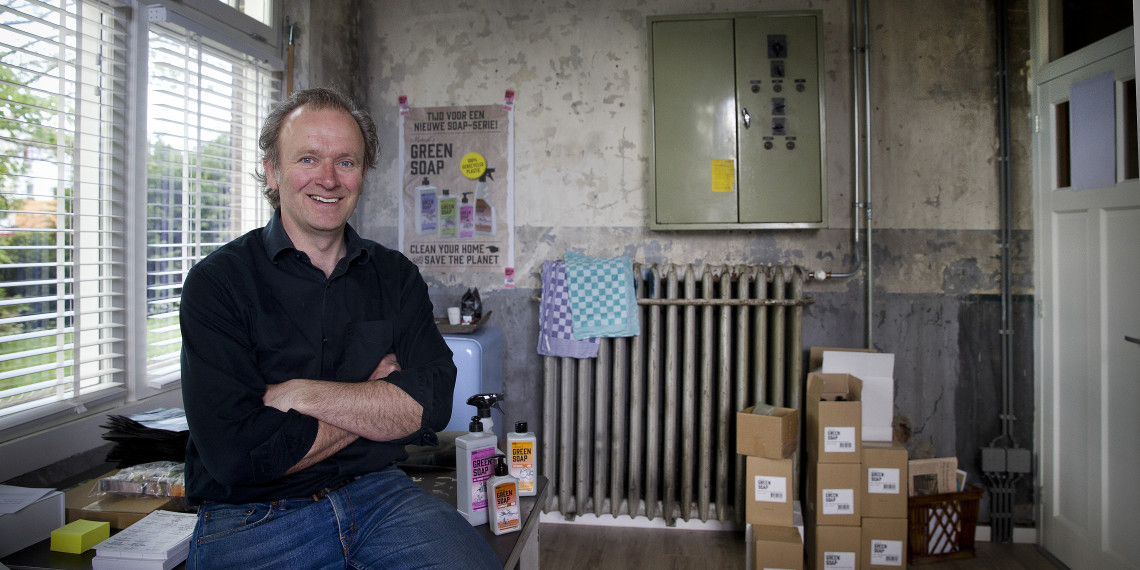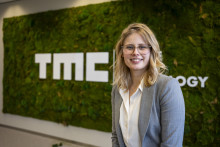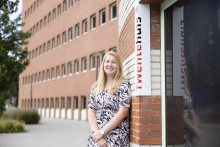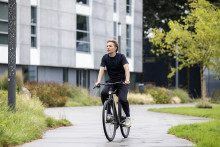Belt only became an entrepreneur five years ago. After graduating in 1988, he spent twenty-five years working for such multinationals as Unilever and Reckitt Benckiser. While he was stationed in Mexico for Reckitt, where he was responsible for the marketing of healthcare and cleaning products, his wife suddenly passed away in 2005. ‘With three girls aged 1, 3 and 5, I thought to myself: ‘what now?’’ Belt says. ‘Reckitt freed up a position for me as General Manager Netherlands. I am still grateful for that.’
Three promises
With his Green Soap products, Marcel Belt makes three promises: ‘The natural aromas smell fresh, they are great to clean with and both the products and their packaging are completely environmentally friendly.’ Belt: ‘Our products are both sustainable and fantastic to work with. With this, we set ourselves apart from other sustainable cleaning products. Those often require you to compromise in some way.’
In 2014, while Belt was working at Douwe Egberts, he decided to take some time off. ‘I wanted to spend more time with my family,’ he says. ‘We had always had an au pair, but by the time my oldest daughter Mila turned fifteen, that was no longer the ideal solution. So I quit my job. I had saved some money over the course of my career, which I figured would last me around five years or so.’
‘Just think how many start-ups go under in the first five years’
Taking control
Still, he found it hard to let go completely. Friends and acquaintances set up their own businesses and asked Belt for advice. ‘At one point, I was helping others so often that it felt like I was in the back seat of a car. I told them to go left here or turn right there, but I was not actually in control myself. That's when I decided to set up my own company.’
The business was clear: cleaning products. ‘When it comes to cleaning products, I know what I'm talking about,’ Belt says. ‘If I can give young entrepreneurs one piece of advice, it would be to play a home game. Choose a sector that you are truly knowledgeable about. There is so much involved in running your own business. With my years of experience, I speak the language of buyers and suppliers, but also of the people who create the formula for the product. If you are a student at the UT and believe you have a golden idea, it is still advisable to work for a wonderful company for a while. Gain some experience first. Just think how many start-ups go under in the first five years. I see the same happening in the networking clubs I am now a member of. Being 56, I am not like most start-ups, of course. On the other hand, my age does give me a head start on all those young men and women.’

Enterprising mindset
Marcel Belt started his career at Unilever. ‘There were 3,500 applicants for twenty-five management trainee positions,’ he says. ‘After a five-round three-month-long selection procedure, I was hired. Fortunately for me, Unilever was looking for a different kind of people than usual at the time; they wanted to move away from the corporate mindset that you find in Amsterdam and Rotterdam. I also impressed them with my internship. As part of the UT's Developmental Science department, I went to Jakarta for Unilever. I had arranged the entire trip myself. Apparently, my enterprising mindset caught their attention.’
After a four-year period of internal training at Unilever, he finally got the foreign post he wanted. Belt left for Hungary. It was a tumultuous period in history. The Iron Curtain, which had separated Western and Eastern Europe for so long, had only recently been torn down. ‘There were cranes everywhere,’ Belt says. ‘More importantly, we got almost complete control over the marketing and sales of our products. There was no infrastructure to speak of, the entire country was in an uproar.’
Next, Belt was sent to Milan, where he was made responsible for the innovation programme in Europe. ‘That was a completely different job,’ he says. ‘Whereas I had enjoyed the freedom of pioneering in the east, I now found myself in a rigidly corporate environment in Milan. That's when I learned that multinationals can be very political organisations. If you have an idea, you must first present it to a level of management. If they like your idea, you get to present it to the next level of management. I quickly grew to detest that rigidity. Even back then, I believed actions speak louder than words.’
‘My daughters gave me the final push I needed’
Daughters
Belt felt right at home in an environment where he could be both a pioneer and an entrepreneur. His company, whose products bear his own first name and have images of his three daughters on their packaging, brings him joy. His daughters are important to him, Belt says. ‘Sustainability was always important to me, but my daughters gave me the final push I needed. Their generation seems to be more mindful of the world around them and they worry more about climate change. I want to do something about the unfairness, because my generation is the one who made a mess of things. When I am gone, I do not want my daughters to remember me as the guy with the massive villa. I'd rather have them think of me as the father who did something good to make his part of the world a better place.’







